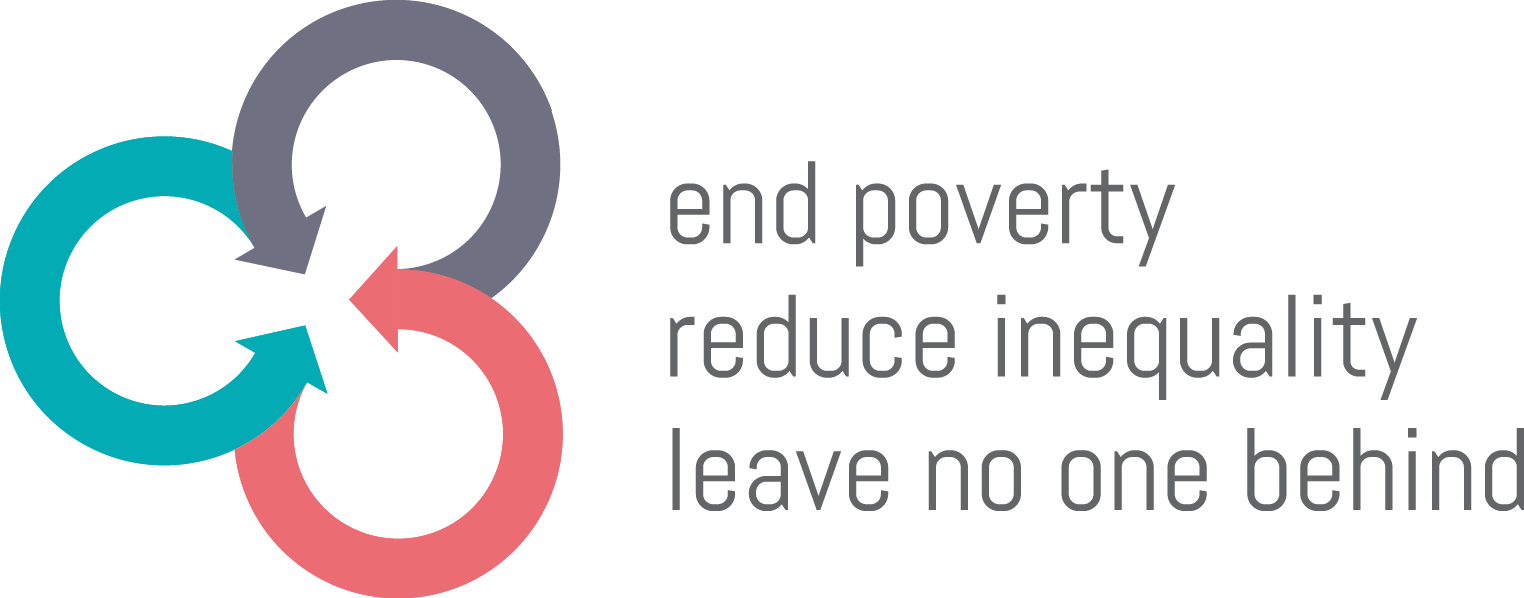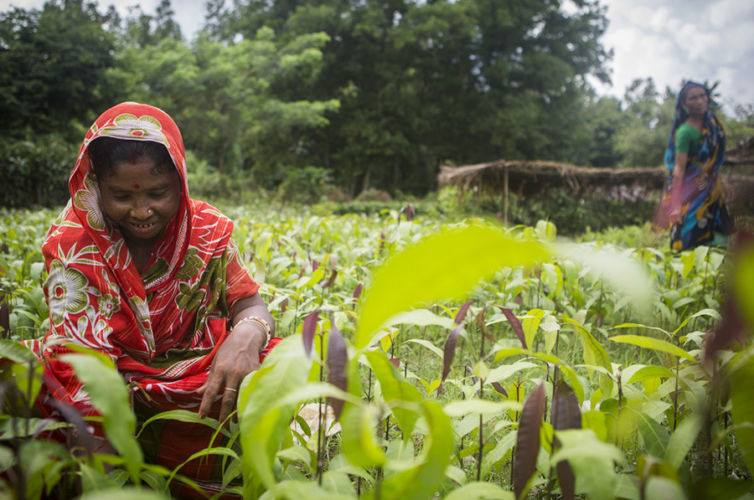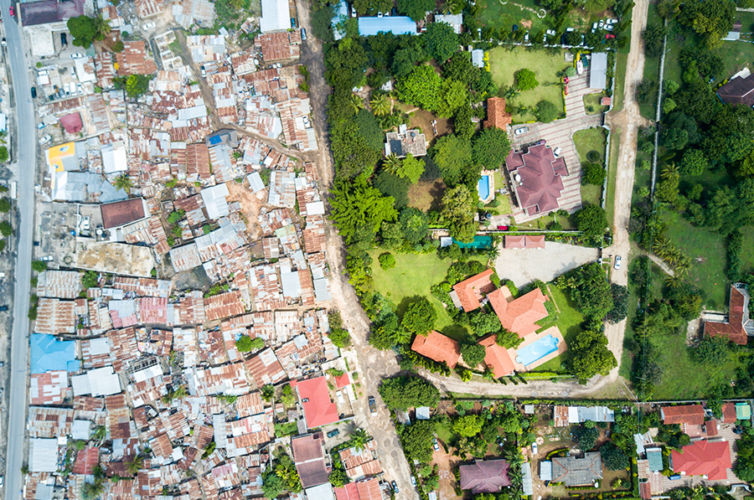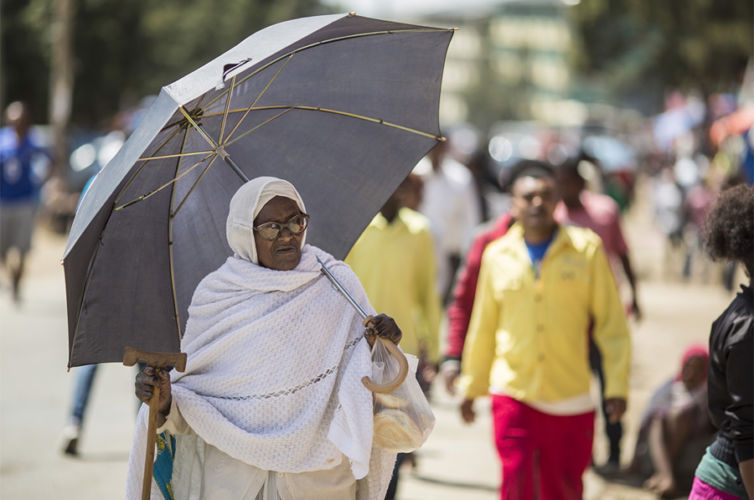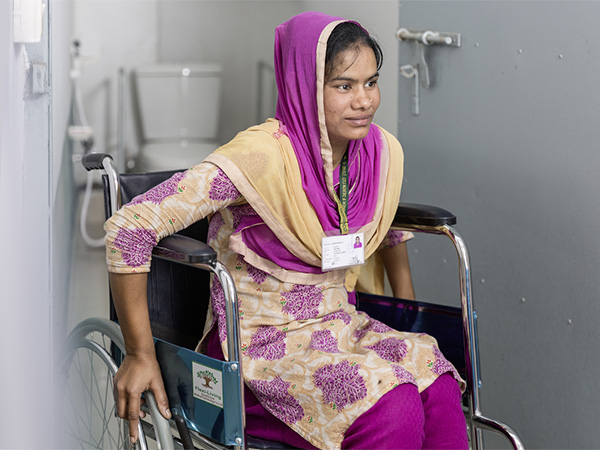
Assessing BRAC’s Innovative Health Loans in protecting the poor against health and asset vulnerability in Bangladesh
BRAC University James P. Grant School of Public Health, Bangladesh
For many in Bangladesh, the lack of access to formal credit and health insurance constitutes the main barrier to accessing healthcare. The poor – who work and live in less sanitary conditions – are at most risk of becoming ill. Since 2013, BRAC has been offering Medical Treatment Loans (MTL) to its microcredit clients. The challenge now is to improve the programme, because despite its success the general demand for MTL remains low due to access barriers and limitations in the product design.
To improve the existing MTL programme by designing an innovative product as well as developing a decentralised and digitised implementation protocol that allows improved access for vulnerable clients and better monitoring of impacts.
Existing BRAC microcredit clients – who are mostly poor by international standards – are the primary target group of MTL.
The project will develop a revised MTL approach incorporating both demand- and supply-side barriers. Primarily, the project enhances equitable inclusion in the programme and increases the speed of reimbursements. Moreover, it conducts a rigorous process evaluation to investigate successful implementation strategies for the programme. A mixed-method research design will be applied to identify and document any unexpected effects of the proposed innovations.
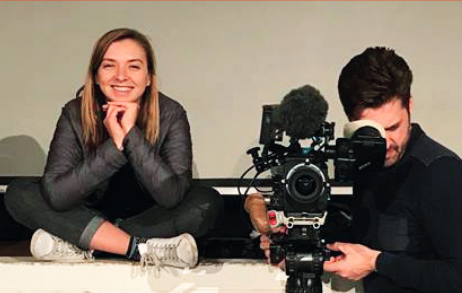
Tackling gender inequality in Serbia through theatre-based education
Serbian Association for Reproductive Health and Rights (SRH), Serbia
Young people in Serbia have grown up in turbulent times and in cultural and economic isolation. Gender divisions in Serbia are well-established due to the lack of will and opportunities to see the perspectives of others. This is especially true among men.
To change accepted gender-related attitudes, expectations, norms and behavioural patterns. The project encourages youth from vulnerable population groups in Serbia to challenge and question traditional gender roles. The project has the potential to galvanise the young audience into questioning stable and deeply-rooted gender-based stereotypes.
Mainly young Roma and returnees between the ages of 14 and 27 of both genders. In the first phase, SRH Serbia will work with the target group directly in four cities across Serbia (Vršac, Kruševac, Zaječar, Pirot) and in the capital Belgrade, thus covering most of Serbia’s administrative territory and reaching out to young Roma people through an existing network of civil society organisations and individuals.
The project will bring young people together in a guided discussion about gender roles through participatory theatre. The project will use an original stage play and a storyline that follows real-life situations and problems (such as parents’ reactions to a marriage between a Roma person and a person from the majority population). To boost the process of learning and empowerment, men will play female roles and women will play male roles.
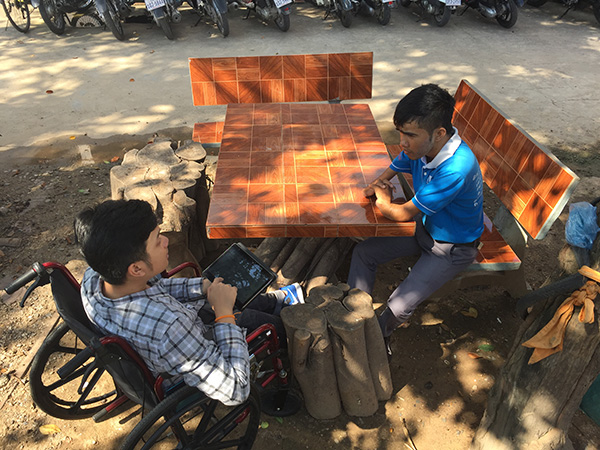
Disability Data App (DDA) in Cambodia
Social Health Protection Program (SHP), GIZ, Cambodia
10% of the Cambodian population experience at least some degree of difficulty when performing basic functions, while those with disabilities continue to face major inequalities. An absence of data about people with disabilities makes it difficult to effectively advocate for their inclusion and to actively target them by government and civil society.
To enable people with disabilities to participate in, and benefit equally and equitably from, a more inclusive Cambodian society. The project’s specific objective is to empower the disability movement in Cambodia by using self-collected data for awareness raising and advocacy to influence service providers as well as local and national decision makers.
Disabled People’s Organisations, representing people with disabilities, are the primary target group.
The project will develop a mobile Disability Data App to allow Disabled People’s Organisations to collect data from the perspective of people with disabilities. By using self-collected data and profiles, Disabled People’s Organisations will be able to conduct well-planned, targeted and evidence-based awareness raising campaigns and advocate for change towards inclusion at local and national levels.
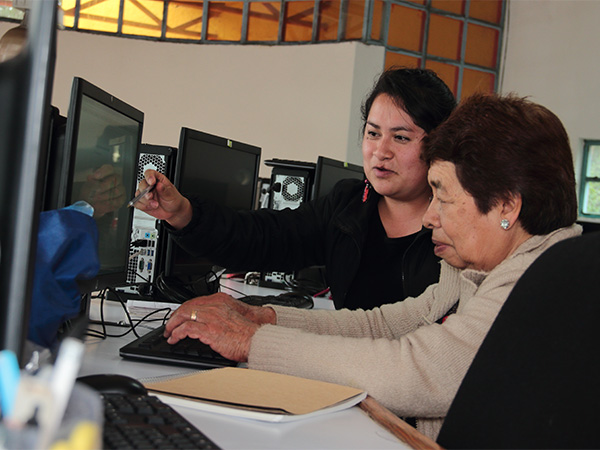
LNOB Benchmarking
El Consejo Nacional de Evaluación de la Política de Desarrollo Social (CONEVAL) and Iniciativa Agenda 2030 (GIZ), Mexico
Although Mexico is making progress towards achieving the 2030 Agenda, it still faces multiple challenges. One key issue relates to the implementation of the ‘leave no one behind’ (LNOB) principle, including addressing extreme poverty and income inequalities. From this perspective, there are several local level opportunities for improved government action and enhanced public sector accountability, particularly with respect to poverty and discrimination.
To make the LNOB performance of each municipality transparent, thereby enabling citizens to compare outcomes and demand improved public services.
The platform will address local decision makers and citizens concerned with the performance of local government in LNOB-related issues. At the same time, it will work as a decision-making tool for municipalities and civil society organisations that represent or work with vulnerable groups (e.g. indigenous communities).
The project will design and implement a comprehensive strategy leading to a local government ‘benchmark competition’ for the best LNOB-performance. This will involve developing and disseminating a digital platform, which will enable citizens to access local government information and compare municipalities’ performances. The LNOB benchmarking project will be implemented with three components: (1) an interactive digital platform, (2) a communication campaign and (3) peer-learning mechanisms to foster the use of the platform and the exchange of best practices between the relevant actors.
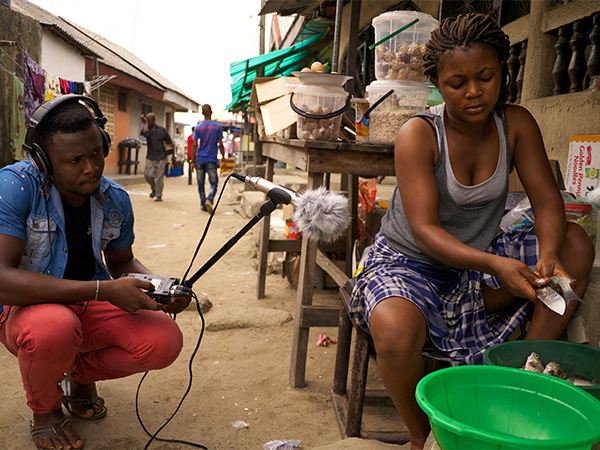
Narrative Geographies: Community mapping and media in Nigeria
Collaborative Media Advocacy Platform (CMAP), Nigeria
Over 70% of Nigeria’s city dwellers live in slum conditions. By 2050, being a young, disenfranchised slum dweller will be Nigeria’s core urban condition. Cities will be both demographically and infrastructurally young. However, even though the young are shaping the face of cities, they are politically under-represented. Port Hartcourt’s informal waterfront settlements are a prime example of socially excluded areas: low-lying, flood-prone and with poor access. Residents experience extreme social inequality and lack a voice in municipal decision-making. If the struggle to overcome deepening social and spatial inequality is to succeed in Nigeria, it must succeed in Nigeria’s slums.
To develop a programme to connect a community media initiative and a participatory mapping project. This will allow residents of the city’s informal settlements to share their experiences and put themselves on the map.
Young slum dwellers, particularly young women who live in Port Harcourt’s informal waterfront settlements.
The final product will be a radio drama that explores residents’ everyday experiences of urban design and urban violence, particularly the tensions between state planners and the ordinary people who have built the communities in which they live. The project combines community media and participatory mapping approaches to establish a catalytic relationship between the creation of open public discourse and the co-production of public space. The mapping team will produce Google Street View maps of communities where the drama is set.
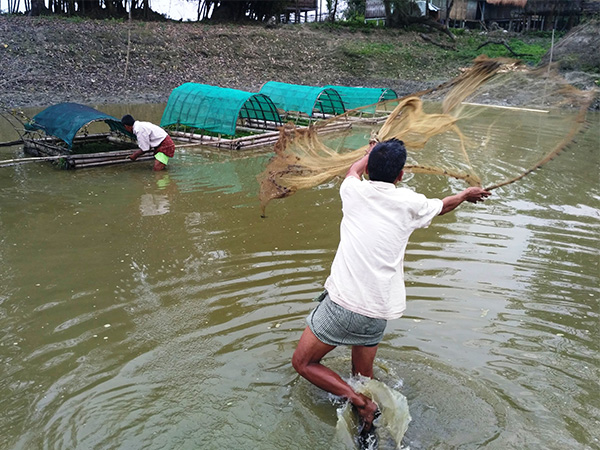
Water farming for climate resilient agriculture and disaster preparedness in India & Bangladesh
South Asian Forum for Environment (SAFE), India
Many people in India and Bangladesh live in agrarian marginal communities close to the floodplains of the major rivers Ganga, Brahmaputra and Padma. Every year, more than one third of the land is completely submerged and about a quarter of it remains partially submerged by floodwaters for five to seven months. Under these conditions, residents struggle to survive; they are faced with the impacts of climate change and risk succumbing to societal disintegration. Those affected are in desperate need of alternative, flood-resilient farming practices in order to maintain food and social security.
To train farmers in hydroponic farming and aquaculture, ensure sustainable livelihoods and food security, and promote inclusive growth through financial inclusion.
The project is located in marginal communities in the east of Majuli River Island, in Assam (India), in Saharsa in Bihar (India) and in Shyamnagar (Bangladesh).
In order to provide a local sustainable solution, the project introduces flood-resilient hydroponic farming practices – specifically those related to the aquaculture of fish – through capacity building and technology transfer. The project team trains young and motivated rural farmers and fisher folk in raft making, cultivation techniques, weed and pest management, and the post-harvest management of rafts. Moreover, local institutions are strengthened through the formation of community groups called ‘Joint Liability Groups’, which work collectively and have a common bank account for earned revenue.
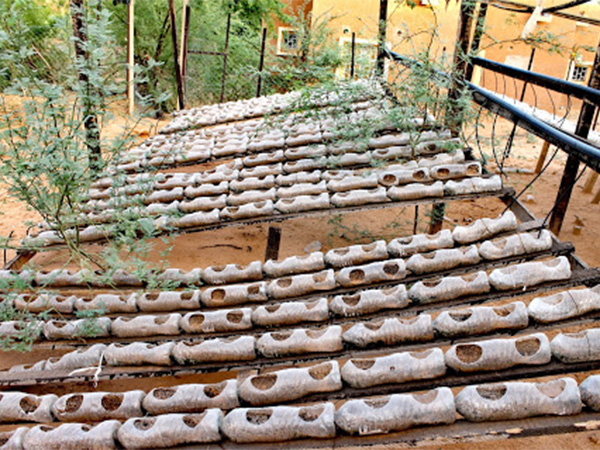
From trash to cash: Through crowdsourcing and local economic development to social inclusion of marginalised groups in Mauritania
Programme de Renforcement de la Décentralisation et des Finances Publiques, GIZ, Mauritania
Slavery was criminalised in Mauritania in 2007. The population of the Haratin, former slaves or descendants of slaves, constitutes 40% of the overall population in the Tagant region. The region belongs to Mauritania’s poorest areas, and the quality and quantity of local service delivery is weak due to a low revenue base in the municipalities and weak capacities of local authorities to mobilise sources of revenue.
To improve the quality of local waste management by combining crowdsourcing and local economic development, while simultaneously making women-led Haratin households less vulnerable to extreme poverty.
Haratin women, in particular women-led Haratin households, are the target group of this project as they are disproportionally affected by discrimination, low-quality local services and extreme poverty.
The project will use a combined approach to improve local waste management: crowdsourcing meets local economic development. It creates a win-set between local government and its citizens by enhancing the quality of service delivery, creating employment, boosting the local economy and improving social inclusion. A competition, which will be judged by an official committee, will be held to choose the best ideas on how to generate income from waste recycling. In a second step, the winning ideas will be implemented in coordination with local authorities, women’s cooperatives and the target group so that they contribute to the quality of local waste management.
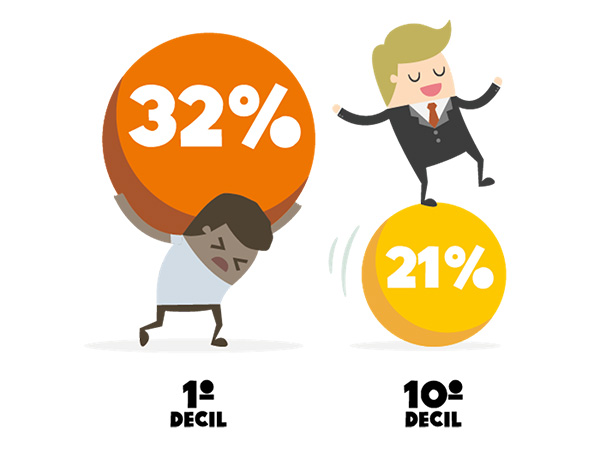
Fair Share project
Oxfam, Brazil
Brazil is the 9th most unequal country on the planet. The richest 5% account for 50% of the national income, and six Brazilians have as much wealth as the bottom 50% of the population. There are several reasons for Brazil’s inequalities, with the country’s tax system one of the most important. Without meaningful and progressive tax reform, there will be no structural change in inequalities.
To shift the terms of the debate around taxation in Brazil. The challenge is to expose the failings of the tax system in order to empower the poorest Brazilians and change the narrative of taxation in Brazil from ‘less taxation’ to ‘fair taxation’.
The bottom 40% of the population, whose average incomes are no higher than R$ 577,00 (150 EUR) per month, less than the Brazilian minimum wage. Among this group, poor black women are the majority.
The ‘Fair Share’ project is a tax calculator, which provides basic information on citizens’ individual tax burden, and simulates new and fairer tax burdens under scenarios of progressive tax reforms in order to provoke public debate around ‘who pays the bill in Brazil’. It will do this through non-technical language that reaches the most vulnerable people.
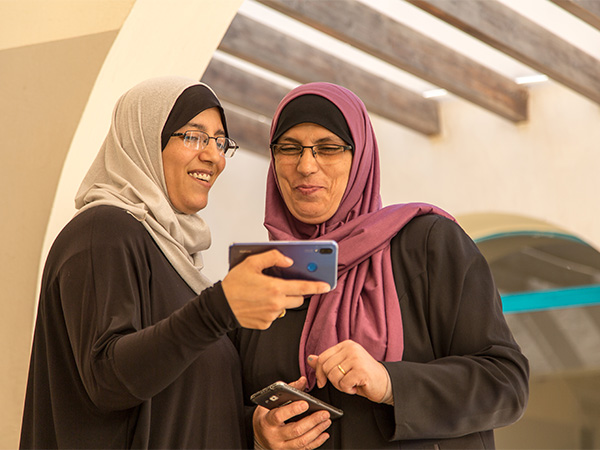
Cl sing the Gap: Women’s empowerment through digital financial services in Jordan
sing the Gap: Women’s empowerment through digital financial services in Jordan
Improving Access to Remittances and other Financial Services through Digital Solutions (Digi#ances), GIZ, Jordan
In Jordan, less than one in three women have access to a bank account. The gender gap in access to finance currently stands at 30% – three times higher than the global average. In general, digital technologies (especially mobile payments) have extended the access to financial services for those at the bottom of society. Mobile money agents function as ‘human touch points’ to enter the digital financial ecosystem. However, of the roughly 1,200 mobile money agents in Jordan, only a handful are women.
To tackle the gender gap in financial inclusion by developing a women’s mobile money agent network in Jordan. The project empowers women by giving them an active role in advancing their financial and economic inclusion.
Research shows that women are more likely to interact with other women when it comes to personal money management. The project therefore aims to engage with female micro, small and medium entrepreneurs.
The project focuses on three main intervention areas: (1) identify and train mobile money agents, (2) build entrepreneurial skills and competencies and (3) facilitate access to markets. To-date, the number of female agents in Jordan is minimal, possibly hindering the uptake of digital financial services by more women. Increasing the number of skilled female mobile money agents will play a catalytic role in increasing financial inclusion among women in Jordan.
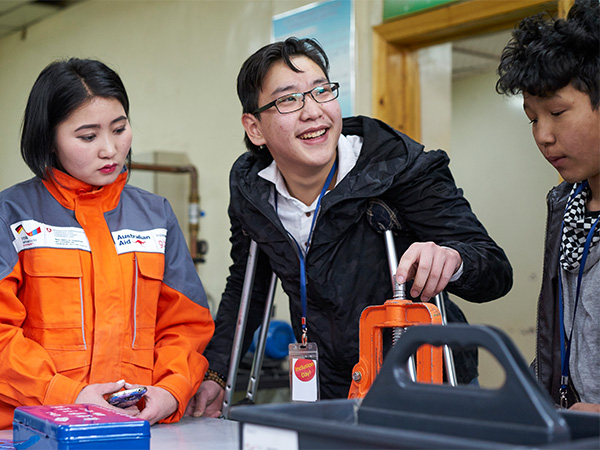
Improving the accessibility of TVET schools in Mongolia
Cooperative Vocational Training in the Mineral Resource Sector Project, GIZ, Mongolia
Of Mongolia’s three million inhabitants, over 100,000 live with some type of disability. One-third of them live in the capital Ulaanbaatar, which also hosts the only Technical and Vocational Education and Training (TVET) school that provides courses to people with disabilities. The remaining 85 vocational schools in the country do not cater to those with disabilities, nor are their premises accessible for people with disabilities. Thus, the majority of people with disabilities do not currently have satisfactory access to formal quality vocational education.
To improve the accessibility of vocational schools in Mongolia. People with disabilities will have a better chance of receiving a formal quality vocational training, and will thus improve their employment options and living standards. Additionally, planned activities will help to increase public awareness and strengthen the social inclusion of people with disabilities.
The project targets (young) people with disabilities. Additional beneficiaries are: university and vocational students from the construction sector, as well as unemployed Mongolians who will boost their employability by acquiring practical construction skills in the process of making the selected vocational schools accessible for all.
The project will develop a mobile app and a website to enable TVET schools to perform self-assessments. A joint renovation competition (a ‘Buildathon’) will be launched among university students and vocational schools to improve accessibility at selected schools. Upon successful external assessment of the improvements, the Ministry of Labour and Social Protection, in partnership with Disabled People’s Organisations, will award the selected school(s) with Accessibility Certification.
